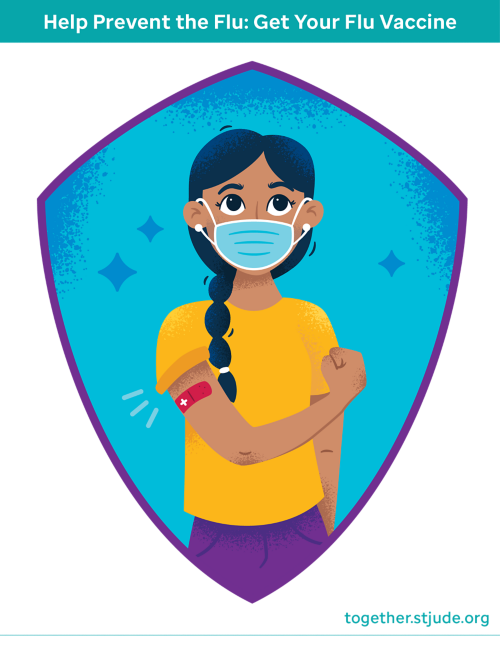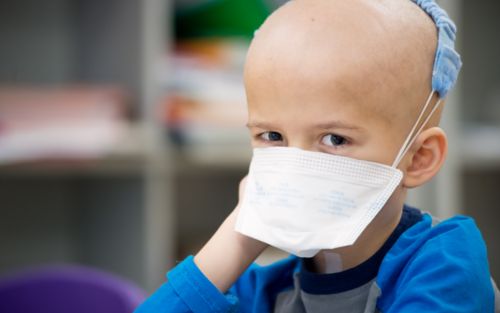Benefits of the flu vaccine
A vaccine strengthens the immune system to protect the body from illness. The flu vaccine helps protect people from developing the flu. Some people may still get the flu after being vaccinated. Even if you do get the flu, you may not get as sick. This is because your body is better able to defend itself after getting the vaccine.
Most people who get flu get better in a few days to less than 2 weeks. But some people develop more serious problems or complications. Some problems can be life threatening.
Sinus and ear infections are examples of moderate complications from the flu. Pneumonia is an example of a serious flu complication.
Flu vaccination is especially important for people with certain medical conditions, including:
- Asthma
- Heart disease
- Diabetes
The flu can make these medical problems worse. For example, people with asthma may get asthma attacks while they have the flu. People with heart disease may have an increased heart attack risk because of the flu.
There are 2 main ways the flu vaccine is given:
Flu shot (needle injection):
- There are several different types of flu shots. Most are given in the muscle of the upper arm. Infants and very young children may get the flu shot in the upper thigh.
- The flu shot is made with dead (inactivated) flu viruses.
- The flu shot is safe for people with weak immune systems.
- If your child has a weakened immune system, your child can take it at least 2 weeks before chemotherapy for the best response to the vaccine. Or they can take it between chemotherapy cycles. In the case of a spreading flu illness, your child should get a flu shot as soon as possible with no delay.
Nasal spray (Flumist®):
- The nasal spray form of the flu vaccine has a weakened live form of the flu virus.
- If your child has a weakened immune system, they should not get the nasal spray form of the vaccine. People in the same household as your child should not get the nasal spray either.
Your health care provider will recommend the best flu vaccine for your child.
Possible side effects of the flu vaccine
Mild side effects are normal after a flu vaccine. Symptoms may include:
- Redness or swelling at the injection site
- Headache
- Fever
- Fatigue
- Nausea
- Body aches
Flu vaccines do not give you the flu. Side effects are usually mild and go away after a few days. This is because the immune system is responding to the vaccine. The body is making antibodies against the flu.
When to get the flu vaccine
If possible, get the flu shot in September or October, or as soon as it becomes available. If you don’t get a flu shot early, getting one any time during the flu season will help protect you. In general, flu cases in the U.S. start to rise in October, peak in December through February, and can last until May.
It takes about 2 weeks to develop an immune response after getting the flu vaccine. In certain cases, children may need 2 doses of the flu vaccine. Your health care provider will tell you if another dose is needed.
Flu vaccines in children with weak immune systems
Medical experts advise that most children with serious illnesses and all children 6 months and older get yearly flu shots. The Centers for Disease Control and Prevention, the American Academy of Pediatrics, and the Infectious Diseases Society of America agree on this advice. It is important to remember that the vaccine is usually not harmful.
Ask your child’s care team when to give your child the flu vaccine. Your child might not respond to the flu vaccine if they have had:
Transplant, cellular (CAR T-cell) therapy, and gene therapy patients can get a flu shot 6 months after their infusion. If there is a flu outbreak in the community, they can get a flu shot 4 months after transplant.
Depending on your child’s diagnosis and treatment plan, the care team will advise when your child should get the flu shot. Talk to your child’s care team about your child’s specific situation.
Flu vaccines for family members
If you have a child with a serious illness, it is important for family members and those in close contact with your child to get the flu vaccine. Young children and those with serious illnesses are at higher risk for life-threatening complications from the flu.
Getting all family members and caregivers vaccinated helps to create a circle of protection around your child.
Flu vaccines and egg allergies
The Centers for Disease Control and Prevention (CDC) recommend that everyone 6 months and older with an egg allergy should get the flu vaccine. Any flu vaccine (egg based or non-egg based) can be used.
It is possible to have both the flu and COVID-19 at the same time. Both COVID-19 and the flu are respiratory infections. The symptoms of COVID-19 and the flu can be the same.
The flu vaccine will not protect you from COVID-19. And the COVID-19 vaccine will not protect you from the flu.
If you have symptoms, your care team will likely test for both illnesses. The test results can help your care team decide the best treatment.
Questions to ask your care team about flu vaccines




